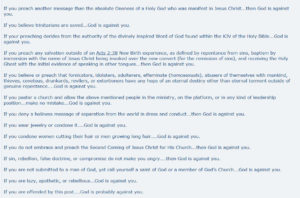Please see Part One.
Note how Paul explains in Galatians that the law is no longer needed and why this is true.
In chapter three, Paul shares how God went straight to Abraham with the promise (and believers are children of Abraham through faith). He goes on to say the law was given to Moses, who then was the mediator between God and the people. He contrasts this with God going directly to Abraham concerning the promise. The law was to remain only until the Messiah came. It did not make void the promise to Abraham, nor did it conflict with it.
We cannot be made righteous by keeping the law and we cannot receive God’s promise by obeying the law. The only way to receive the promise is to believe in Jesus Christ.
Get this next part- verse 23 (NLT): “Until faith in Christ was shown to us as the way of becoming right with God, we were guarded by the law. We were kept in protective custody, so to speak, until we could put our faith in the coming Savior.”
So, if the law was only to act as a guardian until Jesus came, why would we now need any other set of laws to ‘protect’ us or act as a fence to keep us safe?
Paul expounds in the next few verses: “Let me put it another way. The law was our guardian and teacher to lead us until Christ came. So now, through faith in Christ, we are made right with God. But now that faith in Christ has come, we no longer need the law as our guardian. So you are all children of God through faith in Christ Jesus.”
See it? Through faith. Through faith. Through faith. It is all through faith.
Remember where the Bible says that God will write his laws in our hearts? This ties in. That is why there is no need of a written set of laws. No church needs to add laws to act as a fence. There is no need of a fence. Gods ways are now written directly upon our hearts.
Think about it. Written laws do not change the person. The law did not make the people right with God by obeying it. It didn’t change them inside. No list of rules is going to change us, either. But when God places His ways in our hearts, they become part of us. We are no longer just following a set of laws or rules. We do the things we do because God’s Spirit is living inside us and directing us. He has become a part of us, leading and guiding us.
So when we decide to revert to trusting in and following a list of rules to make us right before God, are we not actually rejecting what God has already done for us and given us? Are we not saying to His Spirit that His ways being written on our hearts is not enough? Are we not saying that we are better off taking charge ourselves and we will make sure we are right before Him through our works? Isn’t this why Paul feared in chapter four that his work with the Galatians could be in vain?
A performance oriented church will say it’s not about rules, but they do teach rules. And they teach fear, whether they realize it or not. I have probably said it hundreds of times that fear permeates the teachings. There is always something more, something else, some other way we come up short. And that will always happen when we are pulled into performance based living.
This thing about works- when God’s Spirit comes into our hearts, we will want to do the things of God. So when we read in the Bible where we are told to be water baptized, for example, we will want to be baptized. Not because it is a law; not because we think we’ll be lost if we don’t. We do it because it has been placed in our heart. It is God’s will. He writes those things in our hearts. We do works because we love the Lord. We show our faith through our works (actions). Yet we are not saved through those things and we do not keep ourselves in right standing with God by doing them.
On the cross Jesus said it was finished. Either it is finished or it is not. Either He paid the full price for our sins or we still owe something. Either we have His righteousness by faith or we try and earn it by our works (which cannot be done- thus the continual frustration!).
“So now, through faith in Christ, we are made right with God.”
I highly encourage everyone who has been in an unhealthy church to read and meditate upon the book of Galatians. It will help you to break free from the performance trap and the thinking that it is better to be safe than sorry. Aren’t you tired of all the striving and worrying and periodically feeling unsure of your salvation?
********
Shop at our Amazon store! As an Amazon Influencer, this website earns from qualifying purchases.





